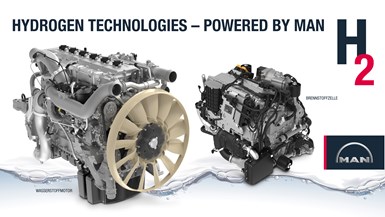MAN Fuels Up with Hydrogen
Truckmaker eyes fuel cell and hydrogen ICE applications
Like most truckmakers, MAN Truck & Bus is working on a variety of alternative propulsion technologies to reduce emissions, including a range of all-electric models.
Several companies—including industry heavyweights such as Daimler, Honda, Hyundai, Toyota and Volvo—also are testing fuel cell-powered trucks, which can offer range and refueling benefits.
MAN also envisions a hydrogen future. But it isn’t limiting itself to fuel cells.
The company, which is part of Volkswagen Group’s Traton subsidiary, also is developing hydrogen-fueled combustion engines.
Hydrogen School
"We take our responsibility towards the environment and society very seriously," says Frederik Zohm, MAN’s executive board member in charge of research & development. "Hydrogen can be an interesting solution here, but then infrastructure needs to be significantly expanded.”

MAN is developing hydrogen-fueled engines and fuel cell systems. (Image: MAN Trucks)
To develop the technology, MAN has established a hydrogen campus within its diesel engine facility in Nuremberg, Germany, where it will partner with two local universities: Friedrich-Alexander Erlangen-Nurnberg (FAU) and Nuremberg Tech (THN).
FAU will focus on basic research, while THN will use its expertise in applied research. MAN will coordinate the program and integrate the technology into fuel cell systems and hydrogen-fueled combustion engines for trucks and buses.
The initiative will span the entire value chain, according to MAN. This includes generating hydrogen from sustainable sources, developing supporting infrastructures, distribution, electrification and developing customer applications.
Longtime Coming
Hydrogen engines are nothing new. In fact, the first internal combustion engine (developed in Europe by Isaac de Rivaz) was designed to run on hydrogen. That was in 1804.
Several other inventors experimented with hydrogen ICEs in the late 1800s, but advances in diesel and gasoline fuels soon pushed it to the background.
More recently, BMW, Daimler and Mazda (with a modified version of its rotary technology) have tested hydrogen engines. But high costs and a lack of a hydrogen infrastructure—along with advances in hybrid and all-electric systems—have stalled development efforts.
To run on hydrogen, most ICE components would need to be strengthened. The fuel system also would need to be modified.
What’s Next
MAN plans to build prototype fuel cell-powered and hydrogen-fueled ICE vehicles within the next year.
Practical trials in cooperation with select customers are planned for 2023/24. The aim is to test the entire hydrogen ecosystem for use in long-distance freight transportation, according to the truckmaker.
“As a commercial vehicle manufacturer, we are facing our industry’s biggest transformation since the invention of the diesel engine,” Zohm says. “Back then, MAN gave Rudolf Diesel the money and equipment he needed to develop his engine. These days, it is all about successfully industrializing alternative drive systems like battery-electric drives, fuel cells and hydrogen combustion engines.”
RELATED CONTENT
-
Jeeps Modified for Moab
On Easter morning in Moab, Utah, when the population of that exceedingly-hard-to-get-to town in one of the most beautiful settings on Earth has more than doubled, some people won’t be hunting for Easter eggs, but will be trying to get a good look at one of the vehicles six that Jeep has prepared for real-life, fast-feedback from the assembled at the annual Easter Jeep Safari.
-
On Electric Pickups, Flying Taxis, and Auto Industry Transformation
Ford goes for vertical integration, DENSO and Honeywell take to the skies, how suppliers feel about their customers, how vehicle customers feel about shopping, and insights from a software exec
-
Multiple Choices for Light, High-Performance Chassis
How carbon fiber is utilized is as different as the vehicles on which it is used. From full carbon tubs to partial panels to welded steel tube sandwich structures, the only limitation is imagination.








